#autism in not linear
Explore tagged Tumblr posts
Text
The Autistic Spectrum is NOT Linear






The Autistic Teacher
#autism#actually autistic#autism in not linear#it’s a spiky profile#there is no ”mild” autism#everyone is different#neurodiversity#neurodivergent#actually neurodivergent#feel free to share/reblog#The Autistic Teacher (Facebook)
2K notes
·
View notes
Text
thinking about chongyun in a dnd esque fantasy setting and he'd probably be a sorcerer paladin. i can't decide if he'd be a sorcerer or a wizard though, would his yang energy be considered innate magic? or would his upbringing in thaumaturgy make him a wizard? this actually brings up interesting questions about chongyun's lore aka whether or not his bloodline has magical ancestry. Is it innate or cultivated/learned throughout generations? ooo.. he could be a wild sorcerer, someone who struggles wielding their innate magic..
but anyway, xingqiu imo would be a rogue fighter maybe? more fighter than rogue... giving him the latter class just because he's a sneaky lil shit
it's easier to give chongyun and xingqiu dnd classes because their weapons and chara stories slot easily into the categories, but for characters who are generic fighters like xiangling and hu tao, it's a little hard to give them something specific. but it allows for some creative liberty so i will say hu tao is a wizard. Xiangling would be a ranger (good for hunting and foraging)
Gaming, my boy, would be a bard and a fighter. yunjin a bard, xinyan also a bard (they'd be a little troupe hehe).
I was watching dunmesh w a friend and we started talking about dnd and bg3. they're more well versed in fantasy terminology so i'm learning as i go. super fun to think about though. i quite adore dnd and fantasy settings a lot
#tangy talks genshin#mm i don't think i'll ever expand upon this au#i just like categorizing.. genshin's current “class” groups are too linear imo.. like yep this person wields a claymore#it's always fun to specify their roles a bit. i think combat abilities in fantasy settings creates lots of avenues for character identities#which just makes them a lot funner to construct... i appreciate this most in fiction. this is why i dont rly like modern aus if the source#material is fantasy sometimes. i think for chongyun's case though his yang energy could be translated to a neurodivergent trait eg autism#but the thing is chongyun to me is already autistic in the context of canon LOL so his yang energy is something a little bit separate-#-from that#wow these tags are long as hell#chongyun#xingqiu#hu tao#xiangling#yunjin#gaming#the more i think about this the more i appreciate chongyun FHSDJG he's so cool cmon. i love him
11 notes
·
View notes
Text
Change is fucking terrifying! Things will be different.
No matter how hard you try, you will NEVER be able to stop it.
Every day that passes changes you, you’re never the same as yesterday, hell the entire universe is never the same as yesterday.
There’s only today, this hour, this minute, this second. Because when you wake up tomorrow you’ll be different than you are right now.
Nothing will ever be the same as right now.
Change is fucking terrifying, but damn is it exciting!
#the mortifying ordeal of living in a linear timeline#poetry#not really#poem? maybe#change#words words words#words#the mortifying ordeal etc etc#i wanna tag this with autism tags cause my experience as autistic fundamentally#shapes the way i view change#actually autistic#existential thoughts#this isn’t fake but imma tag it as unreality cause it might cause someone to spiral#unreality
9 notes
·
View notes
Text
TW: Mentions of weight, disordered eating, therapy, and food.
.
.
.
So, I weighed myself today, and honestly? I think I'm pretty content, I'm 57.2 kg/126.2 lbs, and I'm happy with that, it's a healthy weight, I'm insecure, yes, but I'm trying to work on it. I'm also getting therapy soon, so hopefully she will be able to help me with my disordered eating, and give me coping mechanisms!! I have to workout with my mom again, since I took a break for a month, or two because of low iron, everytime I worked out, I felt weak, and tired, and cold. I also kept accidentally getting hurt while doing weights, but I think I'm doing a bit better now. It's almost Summer!! And I spent all Spring feeling depressed?? That's weird, usually it's the complete opposite, but atleast there's therapy!!!! 🗣🗣
#actually autistic#audhd#actually adhd#actually disabled#autism#low iron#healing is not linear#healing is a process#healing is hard#healing is possible#recovery is possible#pro recovery
1 note
·
View note
Text
I had dinner with one of my oldest friends (24 years!) the other day. We only see each other a couple times a year, and sometimes have gone years without even that. We were catching up as you do and I was filling him in on one of the bigger self realizations I'd had in 2024 (masking - and my relationship with it) and he commented something along the lines of being impressed with how linear my progress with my mental health journey seemed to him. It was just as we were having to say goodbye at the train station and I remember having a jumbled mess of thoughts and emotions in the moment that never had a chance to sort themselves into a coherent whole before we parted ways.
Something caused that interaction to pop into my thoughts yesterday and I guess the time it had to percolate in the back of my head sorted my response out into the concise "it only looks that way because I keep going" and maybe it's just a pseudo deep shower thought but it hit me like a ton of bricks. Because that's it. You keep going. Healing, progress, whatever, it can be a lifelong endeavor if you let it, but in the best way.
Healing can be linear - if you keep going
So I'll keep going. I hope we all will.
#healing can be linear - if you keep going#mental health#adhd#autism#genuinely considering making a cross stitch that says this#even though i swore to myself that i would never torture myself by trying to design anything again#i dont know it just really resonates with me#like yeah there are absolutely setbacks and detours in the journey#but when you zoom out on the squiggly line of progress that line is definitely going In A Direction#stitching and thinking out loud#maybe#oh man i usually avoid using tags in the “so people can find your post” way because its intimidating af but im doin it for this one 😬🫣#wish me luck
2 notes
·
View notes
Text
Coloring inside the lines doesn't sound very queer after all, now does it?
We are all a splotch of color. And while some of us might be mostly colored inside the lines, even they are smidged.
terms like trans, lesbian, gay, bisexual, genderqueer, nonbinary, polyamorous, asexual, aromantic, & queer are just frameworks you can build off of. they're the canvas, you are the paint- each and every person who identifies as these terms has a different interpretation and idea of how to use and approach them. embrace that uniqueness; especially in identities you've never encountered before. that's part of the beauty of life!
#color#this is what a specrum means#the only time a spectrum is linear from a little to a lit is for wavelengths#and that's about light not humans#queer#gender is a spectrum#relationships are a spectrum#so is autism#adhd#any neurodivergency#any physical or mental or social happenstance#humanity is a spectrum
3K notes
·
View notes
Text
What The Autism Spectrum Might Really Look Like
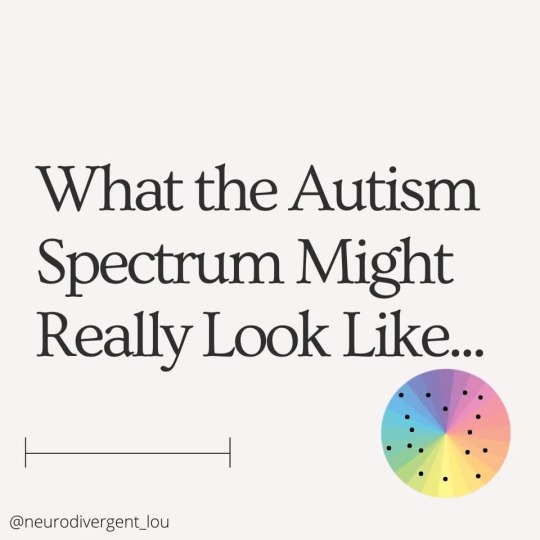
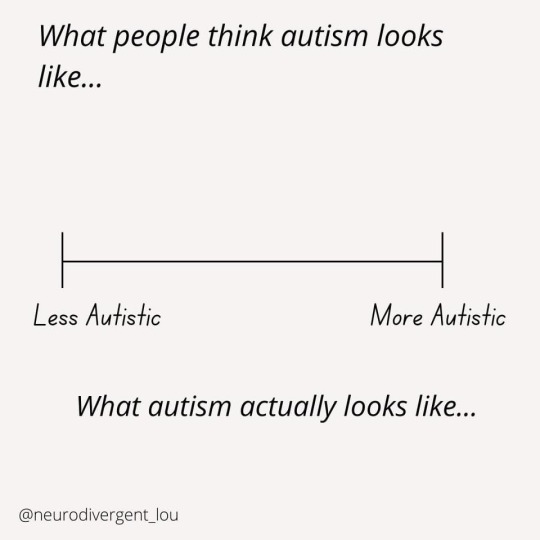
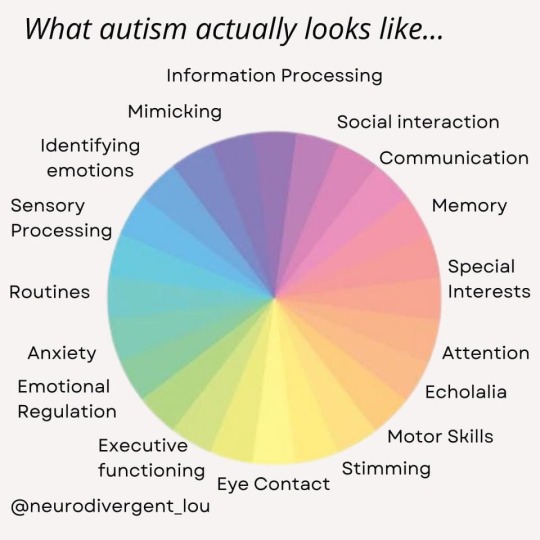
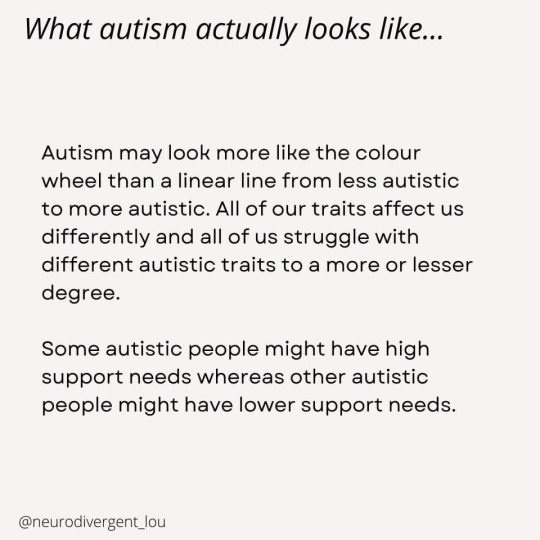
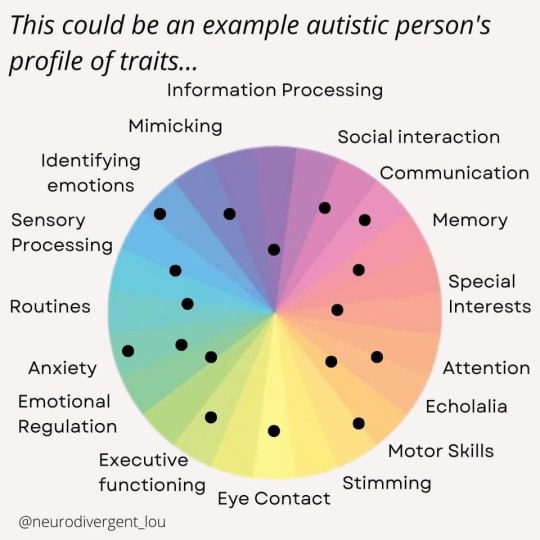
#autism#actually autistic#autism spectrum#what the spectrum can look like#it is not linear#autism spectrum disorder#autism traits#I love this analogy#neurodivergence#neurodiversity#actually neurodivergent#feel free to share/reblog#Neurodivergent_lou (Facebook)
561 notes
·
View notes
Text
just started taking a crapload of supplements for my various chronic illnesses and ADHD and the ✨Tism✨, it’s been a long trip to even this point considering my family doesn’t support diagnosis, much less medication, but now that I’m here, um….. nobody told me a bunch of vitamins and amino acids would affect my emotional state so much???? I mean they did that’s half of what the meds are For but like???? I’m Crying at emotional things??? I’m making people things and kissing them on the head and getting angry and getting excited and getting Sad??? My Sad in particular has been Blank and Void for years and now I’m listening to musical theatre and breaking down sobbing in my living room what is Happening.
#autism#adhd#medication#kinda XD#Ive got a list for y’all if you want it?#My friend recommended most of the supplements to me#And I did my own digging to see if they were legit#And apparently they are#I’ll probably talk about the whole ‘perceiving linear time’ thing later that’s new
1 note
·
View note
Text
The effect of chronic stress and early-life trauma responses on long term health
Two distinct sub-headings of this one topic relating to the impact of childhood experiences and how they can influence the rest of your life, especially in terms of health (perhaps leading to autoimmunity and chronic health conditions), particularly in the context of long undiagnosed types of neurodoversity, have recently come to my attention. As it’s something I have alluded to a few times…

View On WordPress
#adult autism challenges#articles#attachment issues#autism#autism and maturity challenges#childhood stress#childhood trauma and stress neurodiversity#invisible disabilities#masking#neurodiversity#non-linear health triggers#repressed emotions#school trauma autism#sensory trauma#stress response and chronic illness
0 notes
Text
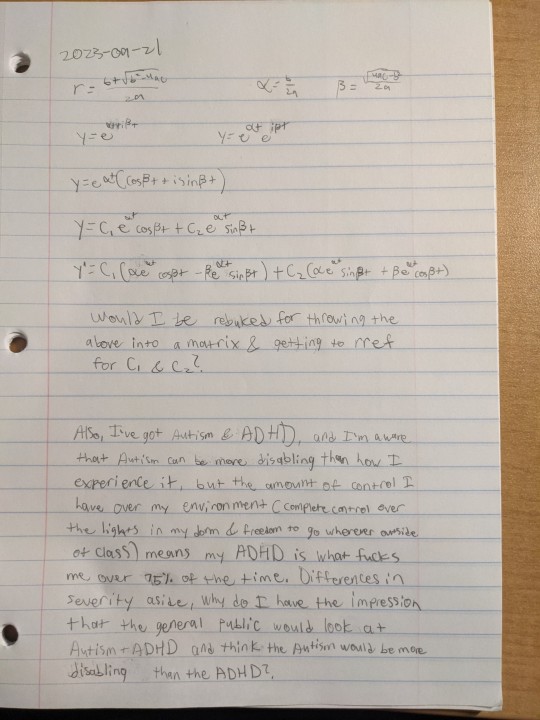
Both parts are at least somewhat related to each other. I'll clarify for any FAQ's later when I have the spoons.
Transcript:
A number of calculations for a general solution for a linear second-order differential equation with constant coefficients. The assumption here is that for coefficients a, b, and c in the differential equation, b-squared is less than 4ac, resulting in complex roots for the quadratic. The root in the upper two quadrants of the Complex Plane is used to get constant coefficients alpha and beta, and then raising e to the power of alpha plus i times beta results in two solutions that solve the differential equation because of Euler's formula. The general solution and its first derivative are written with constant coefficients C1 and C2.
Would I be rebuked for throwing the above (the general solution and its derivative) into a matrix & getting to rref for C1 and C2?
Also, I've got Autism & ADHD, and I'm aware that Autism can be more disabling than how I experience it, but the amount of control I have over my environment (complete control over the lights in my dorm & freedom to go wherever outside of class) means my ADHD is what fucks me over 75% of the time. Differences in severity aside, why do I get the impression that the general public would look at Autism + ADHD and think the Autism would be more disabling than the ADHD?
#math#differential equations#linear algebra#euler's formula#complex numbers#autism#autistic#actually autistic#adhd#neurodivergence#disability
0 notes
Text
my aunt is asking me about the best way to tackle the child's play franchise
my time has come
#AUTISM POWERS ACTIVATE#circus honks#physically restraining myself from saying too much until she actually watches everything all the way through SAGHAGHHGA#luckily child's play has one of the most linear timelines of any horror franchise i've watched B0)
1 note
·
View note
Text

DAY 6 - Individuals
Autism is a non-linear spectrum, and you'll meet all kinds of people on that spectrum ^v^
555 notes
·
View notes
Text
Most of us begin the Autism unmasking process looking for greater self-acceptance, but don’t realize what a messy, uncertain, weakened, traumatized, resentful version of ourselves we’re going to have to accept. Secretly, we hope that the unmasked version of us will be just as capable and comfortable as we always pretended to be — but also much happier, and more authentic.
The great challenge of unmasking, then, is letting go of all pre-conceived notions of the type of person we must be, so that we can simply exist in the moment, feeling whatever we feel and needing whatever we need.
It can take many years for a person to reach this point. I’ve also noticed there are common phases that Autistics move through as we go about unmasking — periods of questioning, self-loathing, anger, withdrawal, exploration, relief, and obsessive self-consciousness, just to name a few.
Not all of these phases appear for everyone, of course and they do not necessarily come in a specific order. Rather than viewing them as stages that progress in a linear fashion, we can see them instead as common psychological defenses that emerge when a person is having a hard time reconciling their disability with their beliefs about who they should be.
Important internal work is happening when a person seems to be “caught” in any particular phase. Some phases are needed corrections for society’s anti-disability stigma — such as the phase where a person believes that Autism makes them inherently superior to allistics. Others are corrections for those corrections, a hypothesis and antithesis that gradually resolve into a synthesis within the disabled person’s life.
These phases don’t last forever, and we learn something important each time that we pass through them. Like the phases of the moon, these phases may recur in our lives in an almost cyclical fashion, bringing us closer to accepting the truth of ourselves each time. Remember as you read through this list of phases that arriving at a final state of “recovery” is not the goal. When we unmask, we’re not trying to get rid of our disability, after all — we’re just hoping to understand and accept all that is inside us a bit better.
And so, to help you prepare for your unmasking journey, here are some of the common phases of unmasking:
Questioning
It’s incredibly common for a masked Autistic person to spend months or even years questioning whether they actually are disabled, or have the “right” to openly identify as such. Even after a person has researched Autism at length, sought external input from loved ones and a therapist, and integrated themselves deeply within the neurodivergent community, they may be struck with regular bouts of uncertainty.
We can blame this on a society that investigates every single claim of disability repeatedly for evidence of fraud, and a culture where disabled people are accused of being delusional, manipulative attention-seekers.
Obsessing (About Autism)
One way that questioning Autistics try to resolve their uncertainty is by consuming every piece of information and commentary about Autism that they could possibly find. Autism often becomes one of our special interests, early in our unmasking — making us see Autism between the pages of every book, and on the confused face of every stranger.
When a person is obsessing about Autism, they may reference their disability as an explanation for every single behavior they or anyone else ever exhibits. Tying your shoes in the “bunny-goes-round-the-tree” style is an Autism thing. Liking the small spoon is an Autism thing. That rude comment I just made about your appearance is an Autism thing, and so you cannot criticize me for it, because that’s a core part of my being I can’t change. Every person in the obsessed Autistic person’s life may be assigned disability labels: he’s got ADHD, she’s a PDAer, your dad’s undiagnosed Autism is the reason he stands in the middle of the room watching TV.
Obsessing (About the Self)
Unmasking requires a high degree of curiosity about the self. A person can’t even notice there’s a disjoint between their authentic feelings and how they present themselves to others unless they look within. Unfortunately, doing so means constantly asking ourselves whether our actions reflect our true selves, and what our “true self” even is — and thinking too much about these questions can make the mind loop back on itself infinitely.
When I first started unmasking, I could not stop assessing how I carried my own body. I knew that my posture was “bad,” in neurotypical terms, but was that because I had muscle underdevelopment caused by Autism, or because I was always trying to make myself inobtrusive and small? Would it be “unmasking” for me to stand straight and claim more space — or would that be me masking even worse, by imitating neurotypical confidence?
Autism Supremacy
Though many unmasking Autistics experience a big drop in self-esteem, it’s equally as common for us to take immense pride in our neurotype, even to an excessive degree. During the Autism supremacy phase of unmasking, Autistic people may feel that their disability actually makes them more moral, logical, emotionally attuned, intelligent, or compassionate than others.
“Autistic people do have empathy! In fact, we have more empathy than anyone else!” You may hear an Autism supremacist declare proudly, pushing back against the stereotype of us as “anti-social” monsters. But the argument that some of us actually experience hyper-empathy, while true, does nothing to challenge the ableism of equating a person’s emotional sensitivity with their humanity.
I wrote about the many phases that unmasking Autistics tend to pass through, and the various needs those phases exist to meet. You can read the full piece (or have it narrated to you by the Substack app) for FREE at drdevonprice.substack.com
159 notes
·
View notes
Text
ok. masking. let’s go.
[plain text: ok. masking. let’s go]
(specifically masking in autism - there probably other disabilities this can apply to but no guarantees. so only write what know, aka autism)
to simply it a bit, personally see two part to masking:
1. ability to mask
2. whatever struggle/thing, can be masked
1. ability to mask
it a skill that depends on many other skills
think most people will able see it as ability to suppress behavior & instead do something else (to appear more “socially appropriate”). like stop body from stim & instead sit very still. stop self from say something that may be rude or blunt n instead say it in more indirect way or say compliment instead. n it true, that is ability to mask
but ability to mask also depend on many other more basic skills, n because it basic, sometimes people forget they actually skill & others struggle with it, n instead see it as given, as nature, almost take for granted. before can do the thing in previous paragraph, other skills need have:
awareness of self - that you exist, awareness of what you doing
(n if able aware, also the ability control what you doing & impulse)
awareness of others - that they exist, that they have thoughts you not see
awareness of surroundings - that, you not just in own world
n, if have all of that, understand “need” or feel need or pressure for masking. at least some conscious or subconscious idea or feeling about what supposed to do & what not supposed to do. n ability to remember it. ability act on it. (all related but separate skills.) some autistic not able explicitly name it or tell you, but have internal sense of “this feels wrong even though don’t know why,” & that still allow them to mask
n many others am forgetting at moment
2. whatever struggle/thing, can be masked
think people forget about this part often: that even if assume have expert ability to mask (#1), there some things that. just can’t be masked (at all, or cannot mask all of it). because they (for not have better word) so extreme, or simply cannot control
for example. there no way really mask fact am nonverbal (as in, cannot mouth talk at all. all the time). no matter what do, cannot just. mask n suddenly say mouth word (then wouldn’t be nonverbal).
n say this simplify because. real world much more muddy more nuanced than can be say in clear linear bullet points n equations. some times, is mixture of both. not that clear divide.
many level 3 / severe / whatever language they use for self / etc people, move their body all the time, make sounds all the time, grunts screams etc. not really able control it, because very significant sensory needs that come with their level 3 autism. n not able to control it, not know to control it. sometimes both.
or, like awareness of other people - if not able to, then can’t mask it (#2). but it also prerequisite skill to masking to appear more “socially appropriate”, so cannot mask if don’t have skill (#1).
*
so, get annoyed when level 1 (& sometimes 2) high masking autistics say difference between them n someone like me (cannot mask & level 2/3 nonverbal), just masking. that if they unmask,
masking often really negatively affect mental health. make you stressed, on edge, confused about who you are (it actually me or just my mask?). n sometimes it become so a part of you you cannot drop it. yes. and same time true:
B1. masking is protective. is coping mechanism. is for safety. or else wouldn’t start do it first place. you mask n spend that energy n put up with its cost because feel like on some level, would not be treat as well or with as much dignity & autonomy, will be bullied n hurt even more than already is. n for some (especially BIPOC), masking literal one of reason they alive, not wrongly convicted or suspected of crime because suspicious behavior, etc. something can be both protective & harm. it up to you decide if it worth it.
B2. high masking not always mean other people not able tell. high masking not mean you treated well all time or not get treated badly at all or not go through anything said in above paragraph. it just mean that. you would probably be treated even worse if not masking.
B3. ability choose to unmask (yes, even if hard), not same as not able mask at all (involuntary not a choice) in first place. able switch between mask n unmask, even more so. you at advantage some of us not have.
B4. like in B1, not everyone can afford unmask. n for every person like that, imagine there someone in similar situation, except they cannot mask (reason #1 or #2 or both). what will happen to them? what happens to them? what happened to them?
no, you wouldn’t be like us (who unable mask in first place because level 2/3 autism, high support needs, severe autism, whatever language we use) if you unmasked.
there also difference between unmasking & finding your authentic self & how you naturally act. n pretend to be like us, copying us, someone you not, by choosing to do stereotypically visibly autistic things because it make you feel more validated. that no different than mocking n faking. we not your cosplay. (yes this actually happens.)
n no, don’t mean anytime you hand flap you’re copying mocking visibly autistic people, or you picking up AAC device “even if you can speak” (but you struggle) is copying nonverbal people. understand this is process, that sometimes when mask so long not know what feel natural anymore who you are or aren’t anymore, so you pick up n experiment different things.
fundamentally, is it helping you? that should stay. is it make you become another person you aren’t, going in opposite extreme direction? that shouldn’t.
*
anyway.
a lot time you see people who not able mask, we level 2/3 / moderate & severe autism / higher support needs (etc language we choose for self), which make us not able do both #1 & 2 (both not have ability to mask, n have struggles that cannot be masked fully or at all). struggling with more “basic” stuff needed for masking like awareness of self others n surrounding, often happen together with other symptoms n struggles that too big or significant or severe to mask.
this why you rarely if ever see anyone like listed above who also appear high masking — even if we can mask, our struggles often too significant to be fully masked over. n many of us can’t mask, we not have prerequisite skills to mask
but, not all people who not able mask are higher level higher support needs higher severity.
sometimes some people may have some masking abilities (have some #1), but have struggles that cannot be fully masked (#2).
sometimes, they have struggles that many other high masking autistics can mask (have #2), but they have low or no masking abilities themselves (don’t have #1).
AKA—
not able mask =/= not always mean higher level higher support needs higher severity autism
lower support needs level 1 autistics =/= not always equal high masking
there lower support needs autistics level 1 autistics who low or no masking!
masking ability not always correlate with levels & support needs & severity!
wow that long winded. glad we got back to where started.
[do not debate severe autism & autism levels etc language we choosing for ourselves - if you don’t like it for yourself cool then am not talking about you]
345 notes
·
View notes
Text
Autism is a spectrum and not linear. One autistic person you know may be completely different from another autistic individual. We all have different strengths and challenges. Some occur more often than others though, for example, sensory issues, fixations or stimming.
(Auctober Day 6: Indiviuals)


175 notes
·
View notes
Note

What do u think about this diva? (headcannons pls I love Krupp and I love people talking about their interpretation of him)
Omg Krupp I love Krupp!!! Before we start I should mention that to me all of the productions are a linear timeline starting with OLC and going to Wembley!
My hcs are that he’s a German built military truck and he was one of 2 components that were released with the original Electra. He has Autism and is very stoic usually, but when with people he likes (aka the electrics) he relaxes and can get pretty reactive! He was built in an adult model so he didn’t really have a ‘growing up’ stage but in training he was taught that anything at all could be a threat to Electra, even things you think you can trust so he’s developed some trust issues but says it’s good and “for Electra’s sake”
He uses German nicknames for Purse and Joule. Usually ‘Bärchen’ for Joule and ‘Schatzi’ or ‘Liebling’ for Purse and when Killerwatt was growing up he would call him ‘Häschen’!
And that’s all I got I really like Krupp but I haven’t necessarily thought that deep into his character…
30 notes
·
View notes